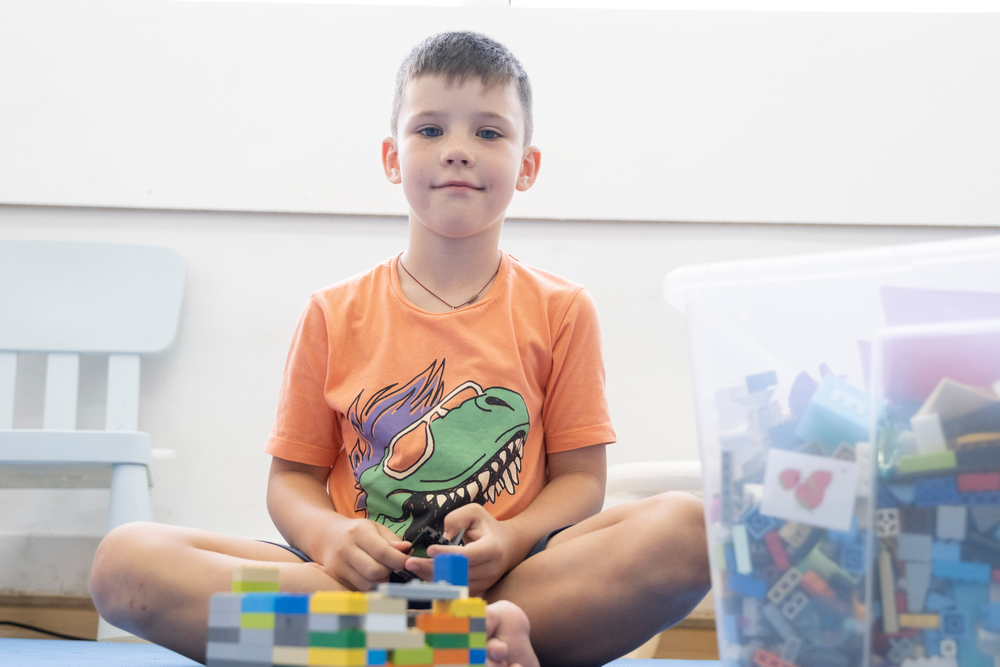
Classes closed by coronavirus crisis – but education is still delivered to children in Greek islands refugee camps
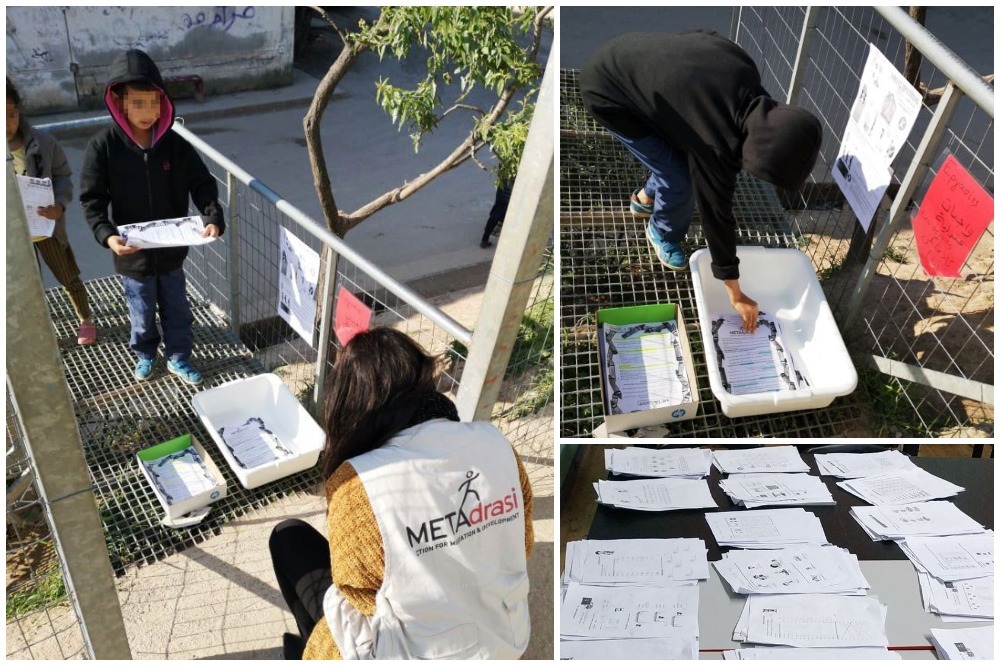
Education in emergencies, Refugees and internally displaced people
Dropping off packages of learning materials is one method used by UNHCR and partners to ensure children are still being reached in the squalid and crowded camps.
In these strangest of times, children from all corners of the world are getting used to having online school lessons at home. But for many refugee and migrant children stranded in camps on the Greek islands, their education is being delivered in a less hi-tech way.
Efforts to stop coronavirus invading the overcrowded camps have led to off-site education centres being shut down and fewer people allowed in from the outside world.
So, once a week, the educational team from the NGO METAdrasi – a partner of the United Nations refugee agency UNHCR – drop off packages of printed learning materials for children on the islands of Lesvos and Chios.
“The materials are based on the children’s levels and ages and include exercises in English, Greek, math and drawing,” said Boris Cheshirkov, spokesperson in Greece for UNHCR.
The finished work is collected later and checked by teachers, who can also share sources for online learning if children have access to smartphones and wifi. In the first week of this operation, more than 380 children used these printed “homework packages”.
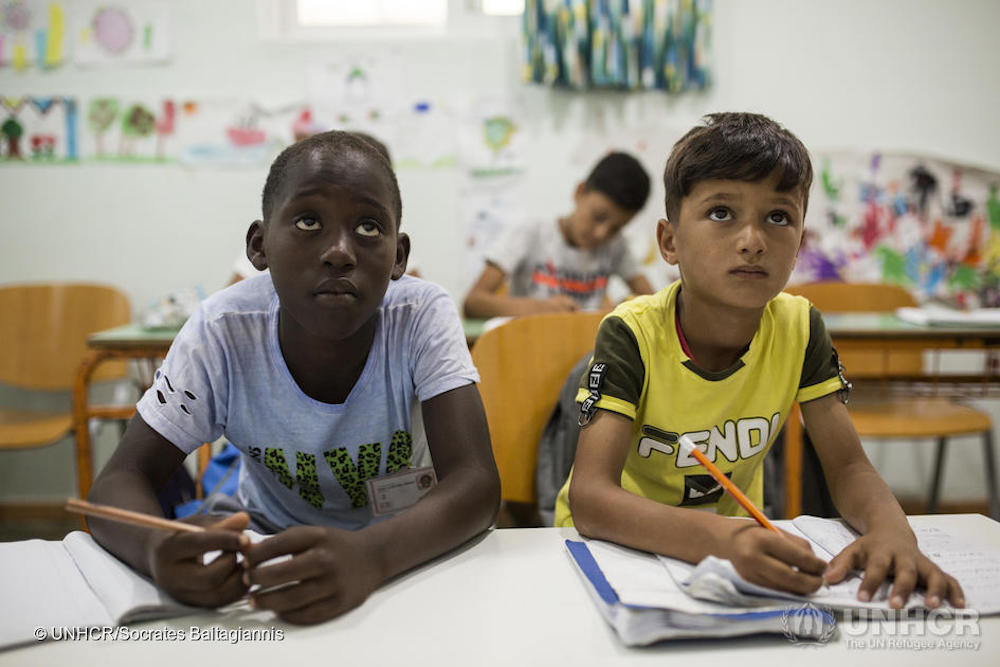
Before the shutdown, these boys were learning Greek at a non-formal education centre supported by UNHCR at the Pyli camp on Kos (UNHCR / Socrates Baltagiannis)
“The students’ commitment and willingness are truly remarkable,” said METAdrasi on its Facebook page. “Every week they come with great anticipation to receive the educational material and to return the exercises they have completed.
“With their big smiles and their desire to learn, they prove to us that when there is dedication from both the students and the teachers, all obstacles can be surpassed, no matter how difficult the conditions might be.”
UNHCR is also exploring alternative methods to enhance its support to online and self-learning. This includes increasing connectivity for refugee households, as well as providing essential material like mobile devices and solar lamps that can also be used to charge phones.
“Conditions in the camps are not good and being outside of a classroom makes things worse. There are reports of exploitation and abuse – especially unaccompanied children and girls. We feel that continuing education activities during the weeks of restrictions is very important,” added Cheshirkov.
The islands are home to 40,000 refugees and asylum-seekers, who live in squalid and cramped facilities while their applications to be accepted on the Greek mainland are processed.
Many of the children have gone without education for years - in some cases they have never set foot inside a classroom. Boris Cheshirkov, UNHCR spokesperson in Greece
Education is crucial to provide a sense of safety and normality for children during the many months they have to wait – but less than a third are getting any schooling.
Theirworld will publish a major report next week on solutions to Greece’s refugee education crisis. Along with Education Cannot Wait – the fund for education in emergencies – we have been helping UNHCR, UNICEF and partner organisations to send girls and boys to non-formal school classes on the islands.
That includes support for the Tapuat Centre near the Moria camp on Lesvos. Last week Their News examined the education and health situation for children at Moria.
UNHCR has been running non-formal educational centres for about 2,000 children on the islands of Lesvos, Chios, Samos, Kos and Leros, where all the camps are seriously overcrowded and lacking in proper hygiene and sanitation.
The agency is scaling up its support to authorities in water, sanitation and health services to try to prevent coronavirus getting a foothold.
“Of the 40,000 refugees and asylum-seekers – who are mainly from Afghan and Syrian families – a third are children and 60% of them are under the age of 12,” said Cheshirkov. “Among them are 1600 unaccompanied minors.
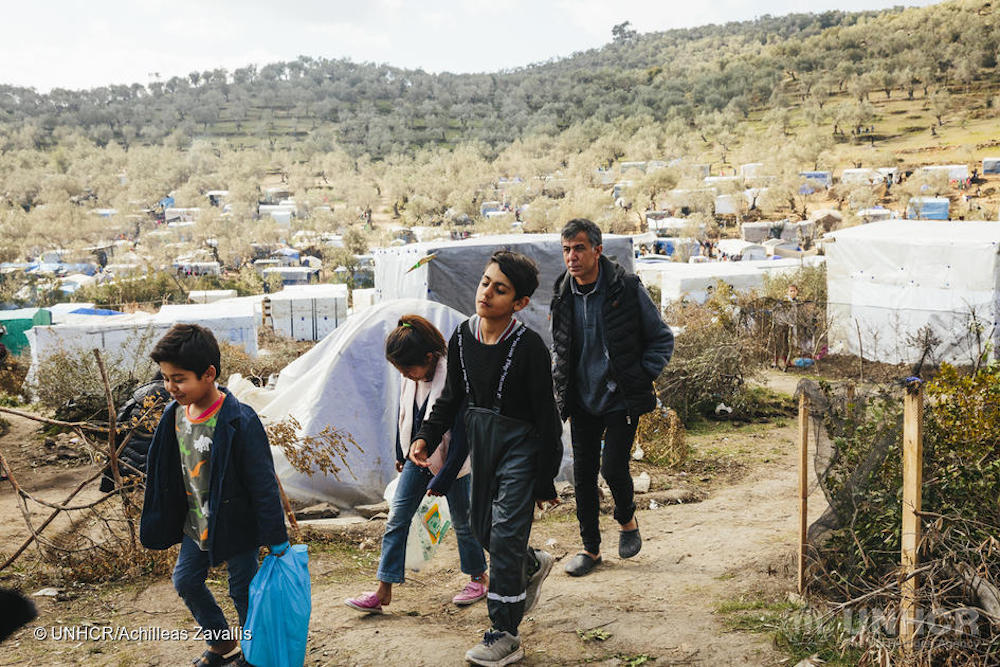
Sardar Hemmat Ashrafi, a doctor and asylum-seeker who fled Afghanistan with his extended family after receiving death threats from the Taliban, walks with his three eldest children towards the Moria camp on Lesvos, to fill plastic bottles with water for washing and cooking
“Only 3% of the children are enrolled in public schools on the islands. Many of the children have gone without education for years – in some cases they have never set foot inside a classroom.
“So it was essential that UNHCR step in while they wait to be allowed into public schools.”
Qasim, a 14-year-old who lives in the Moria camp, said: “All I want is to rest, to be safe and to go to school.” He lost contact with his parents when he fled Islamic State in Syria and hopes to join his brother who lives in Germany.
He told UNHCR in October: “In Syria, I only went to school for three years. It was a good school but they bombed it and we couldn’t go to school anymore.”
The agency has been running non-formal education centres with NGO partners on the islands since 2017. But the Covid-19 pandemic forced the Greek government to close all schools, including those centres, until at least May 10.
Most are outside the refugee camps, so children had been transported to their lessons before the shutdown.
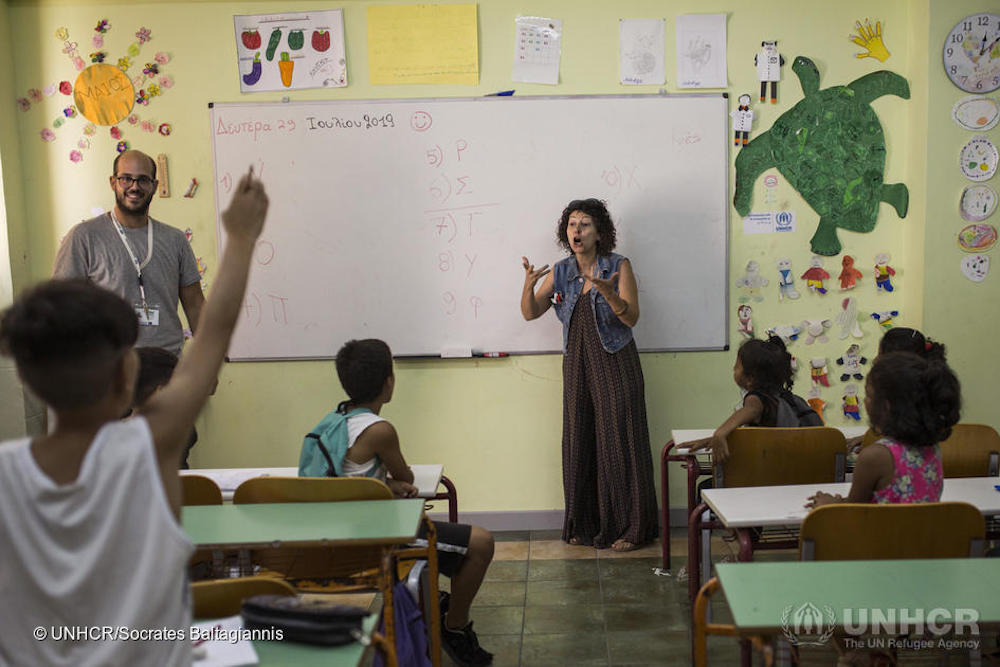
The coronovirus pandemic has shut down schools across Greece, including the non-formal education centres on the Greek islands (UNHCR / Socrates Baltagiannis)
“They spent several hours a day engaged in education activities in a language which they understand, math and other activities with computers,” explained Cheshirkov. “It gave the opportunity for children who are not in public schools to be in a classroom, to have the structure of a school day, to be engaged with their peers.
“It is essential that children are given this opportunity very early after they arrive on the islands. That creates a link for them to ultimately access a public classroom on the mainland.
“A large majority of the asylum-seekers – both children and adults – will ultimately stay in Greece. It is crucial they have the opportunity to integrate – and that includes access to public schools and other forms of learning, to acquire skills and vocational training.”
UNHCR has appealed for at least 20,000 migrants on the islands to be moved to the mainland as quickly as possible to ease the overcrowding and health problems.
“Conditions on the islands are shocking and shameful,” said Filippo Grandi, UN High Commissioner for Refugees, in February. “Greece – with European support – has to act now to deal with an untenable situation, while the longer-term measures are put in place.”
The agency is also assisting Greek authorities in identifying unaccompanied children to be relocated from the islands to other EU countries.
More news

